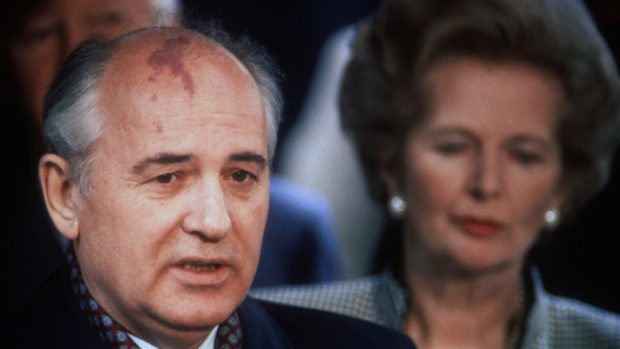Talk of lockdown fraying, easing or relaxing is odd, as there is a perfectly good word to describe what happens next: perestroika.
That was the term Mikhail Gorbachev, the last leader of the USSR, chose to describe opening up the Russian economy, undoing travel restrictions and generally trying to behave like a normal country.
Exactly what’s coming down the track here in the months to come.
Those of us who are of a certain vintage can’t help but remember grainy footage of headscarfed babushkas lining up in anticipation of bread as we lean on our shopping trolleys in the Sainsbury’s car park. Those images invariably illustrated stories of how rubbish Russian life was under the communists.
And look at us now.
The similarities between lockdown Britain and communist Russia are striking. And crucially there are lessons for our politicians to learn from how the USSR unravelled.
As well as the food queues we now have a nationalised economy in which the state pays workers’ wages. We’ve laughable targets like Matt Hancock’s promise to hit 100,000 tests by the end of April, which he achieved by imploring old Tories to get tested and sending out tens of thousands of tests in the mail on the last day of the month. Nonsense Soviet tractor production statistics used to be impugned as sport among right wingers; now they appear to inspire strategy at a Conservative HQ brainstorming session.
The health secretary seems to have particularly taken to the role of ambitious apparatchik. It was he who earlier this week sought to rubbish a Sunday newspaper story about whether the over-70s should all be cocooned from coronavirus. “I’m seeking an urgent correction,” he tweeted.
But given that the article matched official government advice – as evidenced by the screenshots shared by perplexed doctors – it’s unclear what he wanted corrected. His own department’s website presumably.
How the Scottish Health Secretary Jeane Freeman must give thanks that, while she is out of her depth, her Westminster counterpart is clearly sinking. Perhaps the Ministry of Truth will be his next stop after he’s inevitably hooked from his current role once this is over.
It’s hard to decide if Downing Street’s partisan approach to news and truth is inspired more by the Kremlin of the past or the present White House.
It feels like Boris Johnson is trying to game the internet by saying “success” so many times that when anyone Googles “coronavirus UK” the first search result will be “success” rather than revealing the truly awful death toll.
But there are lessons for Downing Street to learn from Soviet history.
The first is that inviting Billy Joel to play a big concert would cheer everyone up (it really happened in 1980s Moscow).
More seriously, perestroika begat nationalism. A concept that, fuelled by populism, has once more taken hold in current politics and bedevils the response to a truly global threat.
But the most pertinent comparison is that perestroika ran out of control. Having signalled that the Soviet Union was changing, the people ultimately shaped that process. In the case of communist regimes in the Kremlin and their puppets across Eastern Europe that was a good thing. When faced with a health emergency a government that loses control of the narrative and process is exposing its electorate to untold and unnecessary danger.
But a government that toys with partisanship and unreliable information will find it harder to hold on to the reins.
The polls may show overwhelming support for a continued lockdown. The streets do not.
My neighbours were out clapping the NHS on Thursday. Then had friends round for a noisy get-together on Friday. Everyone seems to have similar anecdotes.
Polls provide simple but unhelpful headlines. Better to consider research like that from the King’s College Policy Institute last week that drilled down into how people feel about their confinement. They found that while around half the population is coping the other half is not.
King’s College’s neighbours at the London School of Economics found the longer home-schooling goes on the more embedded inequality becomes as some children get online lessons and attentive teachers while poorer pupils are left underemployed.
And as we begin to move out of lockdown, the administration will find it harder and harder to stay ahead of the nation’s behaviour and prevent more deadly waves of disease.
We’re all going to need a holiday. We’re probably not going to be allowed one. But in trying to stop folk from travelling for a restorative break the government may find itself taking on the political equivalent of wrestling the massive inflatable turtle you bought at the beach back into its box after a fortnight in Crete (yes, I know how hard that is from bitter experience – taught the Greeks a few new swear words that day).
The communists had no need for good administration while the population was under their control. Consequently they couldn’t handle a huge undertaking like perestroika. Governing is harder once people are free.
If Boris Johnson’s Downing Street practises good government now – honest, inclusive and grown-up – it will earn the trust necessary to maintain order as we inch towards openness. But the two are intimately connected. They can not and must not take us for granted.
James Millar is a political commentator and author, and a former Westminster correspondent for The Sunday Post

